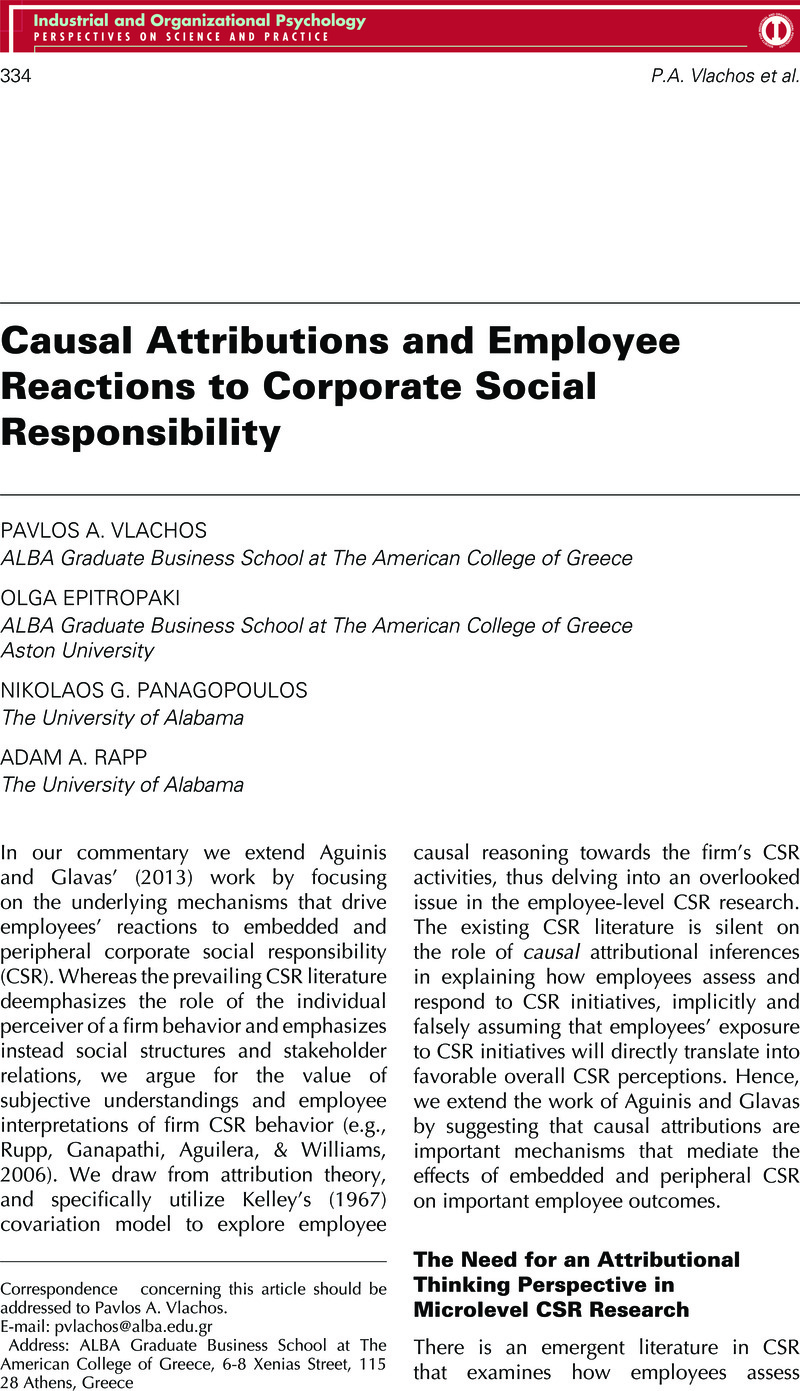Crossref Citations
This article has been cited by the following publications. This list is generated based on data provided by Crossref.
Russell, Sally V.
Evans, Alice
Fielding, Kelly S.
and
Hill, Christopher
2016.
Turn It Off: An Action Research Study of Top Management Influence on Energy Conservation in the Workplace.
Frontiers in Psychology,
Vol. 7,
Issue. ,
Panagopoulos, Nikolaos G.
Rapp, Adam A.
and
Vlachos, Pavlos A.
2016.
I think they think we are good citizens: Meta-perceptions as antecedents of employees' reactions to corporate social responsibility.
Journal of Business Research,
Vol. 69,
Issue. 8,
p.
2781.
Donia, Magda B.L.
and
Tetrault Sirsly, Carol-Ann
2016.
Determinants and consequences of employee attributions of corporate social responsibility as substantive or symbolic.
European Management Journal,
Vol. 34,
Issue. 3,
p.
232.
Leonidou, Constantinos N.
and
Skarmeas, Dionysis
2017.
Gray Shades of Green: Causes and Consequences of Green Skepticism.
Journal of Business Ethics,
Vol. 144,
Issue. 2,
p.
401.
Donia, Magda B.L.
Tetrault Sirsly, Carol-Ann
and
Ronen, Sigalit
2017.
Employee Attributions of Corporate Social Responsibility as Substantive or Symbolic: Validation of a Measure.
Applied Psychology,
Vol. 66,
Issue. 1,
p.
103.
Chaudhary, Richa
and
Akhouri, Anuja
2018.
Linking corporate social responsibility attributions and creativity: Modeling work engagement as a mediator.
Journal of Cleaner Production,
Vol. 190,
Issue. ,
p.
809.
Castro-González, Sandra
Bande, Belén
and
Fernández-Ferrín, Pilar
2019.
Responsible Leadership and Salespeople’s Creativity: The Mediating Effects of CSR Perceptions.
Sustainability,
Vol. 11,
Issue. 7,
p.
2053.
Akhouri, Anuja
and
Chaudhary, Richa
2019.
Employee perspective on CSR: a review of the literature and research agenda.
Journal of Global Responsibility,
Vol. 10,
Issue. 4,
p.
355.
Chaudhary, Richa
and
Akhouri, Anuja
2019.
CSR perceptions and employee creativity: examining serial mediation effects of meaningfulness and work engagement.
Social Responsibility Journal,
Vol. 15,
Issue. 1,
p.
61.
Shen, Jie
and
Zhang, Hongru
2019.
Socially Responsible Human Resource Management and Employee Support for External CSR: Roles of Organizational CSR Climate and Perceived CSR Directed Toward Employees.
Journal of Business Ethics,
Vol. 156,
Issue. 3,
p.
875.
Nazir, Owais
and
Islam, Jamid Ul
2020.
Influence of CSR-specific activities on work engagement and employees’ innovative work behaviour: an empirical investigation.
Current Issues in Tourism,
Vol. 23,
Issue. 24,
p.
3054.
Su, Lujun
Lian, Qi
and
Huang, Yinghua
2020.
How do tourists' attribution of destination social responsibility motives impact trust and intention to visit? The moderating role of destination reputation.
Tourism Management,
Vol. 77,
Issue. ,
p.
103970.
Ellemers, Naomi
and
Chopova, Tatiana
2021.
The social responsibility of organizations: Perceptions of organizational morality as a key mechanism explaining the relation between CSR activities and stakeholder support.
Research in Organizational Behavior,
Vol. 41,
Issue. ,
p.
100156.
Taufik, Danny
and
Dagevos, Hans
2021.
Driving public acceptance (instead of skepticism) of technologies enabling bioenergy production: A corporate social responsibility perspective.
Journal of Cleaner Production,
Vol. 324,
Issue. ,
p.
129273.
Dong, Wenli
and
Zhong, Lifeng
2022.
How and when responsible leadership facilitates work engagement: a moderated mediation model.
Journal of Managerial Psychology,
Vol. 37,
Issue. 6,
p.
545.
Zhang, Zhe
Wang, Juan
and
Jia, Ming
2022.
Multilevel Examination of How and When Socially Responsible Human Resource Management Improves the Well-Being of Employees.
Journal of Business Ethics,
Vol. 176,
Issue. 1,
p.
55.
Moehl, Suhana
and
Friedman, Barry A.
2022.
Consumer perceived authenticity of organizational corporate social responsibility (CSR) statements: a test of attribution theory.
Social Responsibility Journal,
Vol. 18,
Issue. 4,
p.
875.
Chatzopoulou, Erifili-Christina
Manolopoulos, Dimitris
and
Agapitou, Vasia
2022.
Corporate Social Responsibility and Employee Outcomes: Interrelations of External and Internal Orientations with Job Satisfaction and Organizational Commitment.
Journal of Business Ethics,
Vol. 179,
Issue. 3,
p.
795.
Lin, Yi-Ting
Liu, Nien-Chi
and
Lin, Ji-Wei
2022.
Firms’ adoption of CSR initiatives and employees’ organizational commitment: Organizational CSR climate and employees’ CSR-induced attributions as mediators.
Journal of Business Research,
Vol. 140,
Issue. ,
p.
626.
Wang, Xu
Xiang, Changchun
Meng, Liang
Chi, Lei
and
Li, Songpu
2023.
External corporate social responsibility promotes employees’ unethical pro-organizational behavior: An attribution perspective.
Current Psychology,
Vol. 42,
Issue. 25,
p.
21326.



